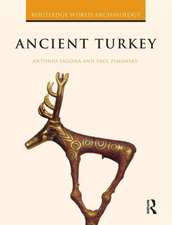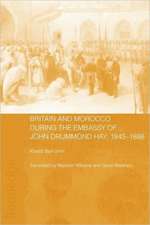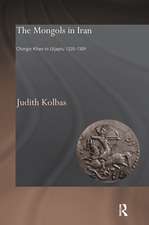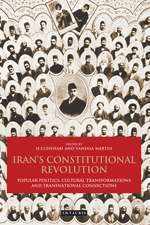Britain's Moment in Palestine: Retrospect and Perspectives, 1917-1948: Israeli History, Politics and Society
Autor Michael J. Cohenen Limba Engleză Paperback – 4 dec 2015
During the first decade of the Mandate the British enjoyed an influx of Jewish capital mobilized by the Zionists which enabled them not only to fund the administration of Palestine, but also her own regional imperial projects. But in the mid-1930s, as the clouds of World War Two gathered, Britain’s commitment to Zionism was superseded by the need to secure her strategic assets in the Middle East. In consequence she switched to a policy of appeasing the Arabs. In 1947, Britain abandoned her attempts to impose a settlement in Palestine that would be acceptable to the Arab States and referred Palestine to the United Nations, without recommendations, leaving the antagonists to settle their conflict on the battlefield.
Based on archival sources, and the most up-to-date scholarly research, this comprehensive history offers new insights into Arab, British and Zionist policies. It is a must-read for anyone with an interest in Palestine, Israel, British Colonialism and the Middle East in general.
| Toate formatele și edițiile | Preț | Express |
|---|---|---|
| Paperback (1) | 352.26 lei 3-5 săpt. | +34.01 lei 7-13 zile |
| Taylor & Francis – 4 dec 2015 | 352.26 lei 3-5 săpt. | +34.01 lei 7-13 zile |
| Hardback (1) | 1134.13 lei 6-8 săpt. | |
| Taylor & Francis – 26 feb 2014 | 1134.13 lei 6-8 săpt. |
Din seria Israeli History, Politics and Society
-
 Preț: 348.24 lei
Preț: 348.24 lei - 22%
 Preț: 326.96 lei
Preț: 326.96 lei -
 Preț: 416.22 lei
Preț: 416.22 lei -
 Preț: 449.25 lei
Preț: 449.25 lei - 18%
 Preț: 1113.91 lei
Preț: 1113.91 lei - 18%
 Preț: 1332.52 lei
Preț: 1332.52 lei -
 Preț: 416.22 lei
Preț: 416.22 lei - 25%
 Preț: 502.68 lei
Preț: 502.68 lei -
 Preț: 440.77 lei
Preț: 440.77 lei - 25%
 Preț: 824.70 lei
Preț: 824.70 lei - 18%
 Preț: 1002.63 lei
Preț: 1002.63 lei -
 Preț: 436.14 lei
Preț: 436.14 lei - 12%
 Preț: 299.52 lei
Preț: 299.52 lei - 23%
 Preț: 328.81 lei
Preț: 328.81 lei - 24%
 Preț: 324.59 lei
Preț: 324.59 lei -
 Preț: 412.37 lei
Preț: 412.37 lei - 22%
 Preț: 335.49 lei
Preț: 335.49 lei - 18%
 Preț: 1057.13 lei
Preț: 1057.13 lei - 22%
 Preț: 339.76 lei
Preț: 339.76 lei -
 Preț: 473.04 lei
Preț: 473.04 lei -
 Preț: 436.14 lei
Preț: 436.14 lei -
 Preț: 413.33 lei
Preț: 413.33 lei - 26%
 Preț: 215.19 lei
Preț: 215.19 lei -
 Preț: 394.39 lei
Preț: 394.39 lei - 18%
 Preț: 1056.28 lei
Preț: 1056.28 lei - 18%
 Preț: 1056.32 lei
Preț: 1056.32 lei -
 Preț: 436.14 lei
Preț: 436.14 lei - 18%
 Preț: 1065.40 lei
Preț: 1065.40 lei - 18%
 Preț: 1113.16 lei
Preț: 1113.16 lei - 25%
 Preț: 827.23 lei
Preț: 827.23 lei -
 Preț: 455.19 lei
Preț: 455.19 lei -
 Preț: 383.75 lei
Preț: 383.75 lei -
 Preț: 416.22 lei
Preț: 416.22 lei - 27%
 Preț: 144.76 lei
Preț: 144.76 lei - 21%
 Preț: 335.33 lei
Preț: 335.33 lei - 31%
 Preț: 369.82 lei
Preț: 369.82 lei - 26%
 Preț: 848.15 lei
Preț: 848.15 lei - 18%
 Preț: 1064.01 lei
Preț: 1064.01 lei
Preț: 352.26 lei
Nou
Puncte Express: 528
Preț estimativ în valută:
67.40€ • 70.38$ • 55.79£
67.40€ • 70.38$ • 55.79£
Carte disponibilă
Livrare economică 15-29 martie
Livrare express 01-07 martie pentru 43.100 lei
Preluare comenzi: 021 569.72.76
Specificații
ISBN-13: 9781138193888
ISBN-10: 1138193887
Pagini: 564
Ilustrații: 13
Dimensiuni: 156 x 234 x 28 mm
Greutate: 0.75 kg
Ediția:1
Editura: Taylor & Francis
Colecția Routledge
Seria Israeli History, Politics and Society
Locul publicării:Oxford, United Kingdom
ISBN-10: 1138193887
Pagini: 564
Ilustrații: 13
Dimensiuni: 156 x 234 x 28 mm
Greutate: 0.75 kg
Ediția:1
Editura: Taylor & Francis
Colecția Routledge
Seria Israeli History, Politics and Society
Locul publicării:Oxford, United Kingdom
Public țintă
Postgraduate and UndergraduateCuprins
Preface Introduction 1 Britain and Zionism: the Domestic Context 2 World War One: How Britain assumes the Palestine Mandate 3 Palestine and the Near East, 1919-1923 4 The Military Administration, 1918-1920 5 Colonial Palestine 6 Re-defining Policy in Palestine 7 1923: The Balfour Declaration Challenged 8 Paying for Empire in the 1920s 9 The Yishuv Economy in the 1920s 10 The Unravelling of the Mandate, 1929-31 11 The Arab Rebellion I: April-October 1936 12 The Arab Rebellion II: July 1937-39 13 Appeasement in the Middle East, 1937-39 14 World War Two: The Jews 15 The Allies, the Zionists and the Holocaust 16 World War Two: The British and the Arabs 17 The Arabs and Nazi Germany 18 The Mufti of Jerusalem in Berlin: 1941-1945 19 Why the British Left 20 The British Lose Control 21 Conclusion
Notă biografică
Michael Joseph Cohen was born in England, and earned his Ph.D. under the late Elie Kedourie at the London School of Economics. He is Professor Emeritus in History at Bar-Ilan University. He has published widely on the Palestine Mandate and the establishment of the state of Israel.
Recenzii
Michael Cohen has written a comprehensive and fair-minded account of the Palestine mandate from the antecedents of the Balfour declaration in 1917 to the consequences of the founding of the state of Israel in 1948. The dominant themes are the contradictions of British rule and the military as well as the demographic aims of the Zionists to ‘make Palestine as Jewish as England was English’. His book will be used as a work of reference as well as a balanced judgment from all angles, Arab and American as well as British and Zionist. Readers will be especially interested in his interpretation of anti-Semitism, Arab collaboration with the Nazis, and the Holocaust in relation to the creation of the Jewish state. His command of archival and secondary sources establishes Britain’s Moment in Palestine as an essential work of research and interpretation.
-- Professor Wm. Roger Louis holds the Kerr Chair of English History and Culture at the University of Texas, Austin, and is editor-in-chief of The Oxford History of the British Empire
Superbly researched and meticulously written, this book is the result of extensive research on the history of the Palestine mandate from the Balfour Declaration (1917) to the establishment of the state of Israel (1948). Cohen (Bar-Ilan Univ., Israel), a prominent historian of the Middle East, examines this complex history with an impressive command of archival sources. In nearly 500 pages, he provides an extensive account about Britain’s changing policy in Palestine and how it contributed to the Arab-Zionist conflict. Readers will find discussions on a wide range of subjects, such as Britain’s early commitment to Zionism, the Holocaust, and the establishment of the state of Israel; the Grand Mufti of Jerusalem and his relations with the Nazis; the Arab rebellions; Benito Mussolini’s policy in Palestine; and much more. A must read for students and scholars of British imperialism in the Middle East between the two war worlds. Summing Up: Essential. Most levels/libraries.
--B. Rahimi, University of California San Diego
CHOICE, April 2015
-- Professor Wm. Roger Louis holds the Kerr Chair of English History and Culture at the University of Texas, Austin, and is editor-in-chief of The Oxford History of the British Empire
Superbly researched and meticulously written, this book is the result of extensive research on the history of the Palestine mandate from the Balfour Declaration (1917) to the establishment of the state of Israel (1948). Cohen (Bar-Ilan Univ., Israel), a prominent historian of the Middle East, examines this complex history with an impressive command of archival sources. In nearly 500 pages, he provides an extensive account about Britain’s changing policy in Palestine and how it contributed to the Arab-Zionist conflict. Readers will find discussions on a wide range of subjects, such as Britain’s early commitment to Zionism, the Holocaust, and the establishment of the state of Israel; the Grand Mufti of Jerusalem and his relations with the Nazis; the Arab rebellions; Benito Mussolini’s policy in Palestine; and much more. A must read for students and scholars of British imperialism in the Middle East between the two war worlds. Summing Up: Essential. Most levels/libraries.
--B. Rahimi, University of California San Diego
CHOICE, April 2015
Descriere
In 1917, the British issued the Balfour Declaration for military and strategic reasons. This book analyses why and how the British took on the Palestine Mandate. It explores how their interests and policies changed during its course and why they evacuated the country in 1948.
During the first decade of the Mandate the British enjoyed an influx of Jewish capital mobilized by the Zionists which enabled them not only to fund the administration of Palestine, but also her own regional imperial projects. But in the mid-1930s, as the clouds of World War Two gathered, Britain’s commitment to Zionism was superseded by the need to secure her strategic assets in the Middle East. In consequence she switched to a policy of appeasing the Arabs. In 1947, Britain abandoned her attempts to impose a settlement in Palestine that would be acceptable to the Arab States and referred Palestine to the United Nations, without recommendations, leaving the antagonists to settle their conflict on the battlefield.
Based on archival sources, and the most up-to-date scholarly research, this comprehensive history offers new insights into Arab, British and Zionist policies. It is a must-read for anyone with an interest in Israel, and the Middle East in general.
During the first decade of the Mandate the British enjoyed an influx of Jewish capital mobilized by the Zionists which enabled them not only to fund the administration of Palestine, but also her own regional imperial projects. But in the mid-1930s, as the clouds of World War Two gathered, Britain’s commitment to Zionism was superseded by the need to secure her strategic assets in the Middle East. In consequence she switched to a policy of appeasing the Arabs. In 1947, Britain abandoned her attempts to impose a settlement in Palestine that would be acceptable to the Arab States and referred Palestine to the United Nations, without recommendations, leaving the antagonists to settle their conflict on the battlefield.
Based on archival sources, and the most up-to-date scholarly research, this comprehensive history offers new insights into Arab, British and Zionist policies. It is a must-read for anyone with an interest in Israel, and the Middle East in general.
























